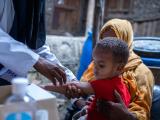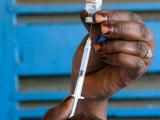Dec 12, 2002 (CIDRAP News) President Bush tomorrow will announce a plan to begin vaccinating military personnel and front-line healthcare workers against smallpox early next year and to offer the vaccine to the public in 2004, according to reports from major news organizations today.
In an interview taped for the program "20/20," Bush told Barbara Walters of ABC News that the vaccine will be offered to the public on a volunteer basis starting sometime in 2004. Excerpts of the interview were broadcast on ABC News yesterday, and the "20/20" show is scheduled to air tomorrow.
Today, a Los Angeles Times report quoted an unnamed administration official as saying that Bush will announce a plan to vaccinate 500,000 military personnel and offer vaccinations to about 500,000 public health and hospital workers who could be called on to deal with a smallpox outbreak. Those numbers agree with previous predictions by administration officials.
As reported on an ABC News Web site, Bush told Walters, "The need for this administration [is] to provide the opportunity for people to protect themselves, should there be a smallpox attack. In other words, I don't think people ought to be compelled to make the decision which is best for their family."
The ABC News report said Bush will announce a program in which "first responders and military personnel" will be vaccinated first, starting in 2003. By 2004, the report said, the nation will have enough newly manufactured, federally licensed vaccine to inoculate the whole population. The statement presumably referred to the vaccine that Acambis and Baxter International are producing in laboratory cell cultures. The government's current stockpile of old vaccine was grown in the skin of vaccinia-infected calves.
Old vaccine that is not licensed by the Food and Drug Administration (FDA) will not be used to vaccinate anyone unless a smallpox outbreak occurs, according to the ABC report. The FDA is currently inspecting and licensing individual lots of the government's decades-old stockpile of about 15 million doses of Dryvax smallpox vaccine. The government also has about 80 million doses of an Aventis smallpox vaccine that has been stored for decades in frozen form and is unlicensed.
For several months the administration has been weighing the risk of a bioterrorist release of smallpox virus against the risk of serious reactions to the vaccine. The latest reports come as the Centers for Disease Control and Prevention (CDC) evaluates smallpox vaccination plans submitted in the past 2 weeks by states, territories, and four metropolitan areas.
Under requirements tied to federal bioterrorism preparedness grants, states were supposed to submit by Dec 2 their plans for rapid vaccination of the public in the event of a smallpox outbreak. On Dec 9 the states were required to file supplemental plans for preemptive vaccination of frontline healthcare workers.
All 62 US jurisdictions (including the 50 states, eight territories, Washington, DC, New York City, Los Angeles, and Chicago) have turned in their post-attack vaccination plans, and the CDC is reviewing them, CDC spokeswoman Katie Hoskins told CIDRAP News today. She said 49 states and the four cities have submitted their plans for pre-event vaccination of healthcare workers, and the CDC has given all of them general approval.
On the basis of a preliminary review of the state plans, about 450,000 public health and healthcare workers may be offered the vaccine when it becomes available, Hoskins said. That figure is close to federal health officials' previous estimate of about 500,000.
"The main thing now is, everyone is waiting for guidance from the White House," Hoskins said. "That determines what the states and territories will do next." Meanwhile, the CDC is providing some feedback and suggestions on the state plans, she added.
The New York Times today quoted unnamed administration officials as predicting that the Department of Defense will begin vaccinating military personnel within weeks. Inoculation of healthcare workers, as described in the state plans, is likely to start around the beginning of January, the officials said.
However, recently enacted legislation to protect smallpox vaccine manufacturers and those who administer the vaccine from liability for vaccine side effects does not take effect until Jan 24. The measure was part of the act that establishes the Department of Homeland Security. In a Reuters Health report today, unidentified federal officials said no vaccinations can begin until that measure takes effect.

















